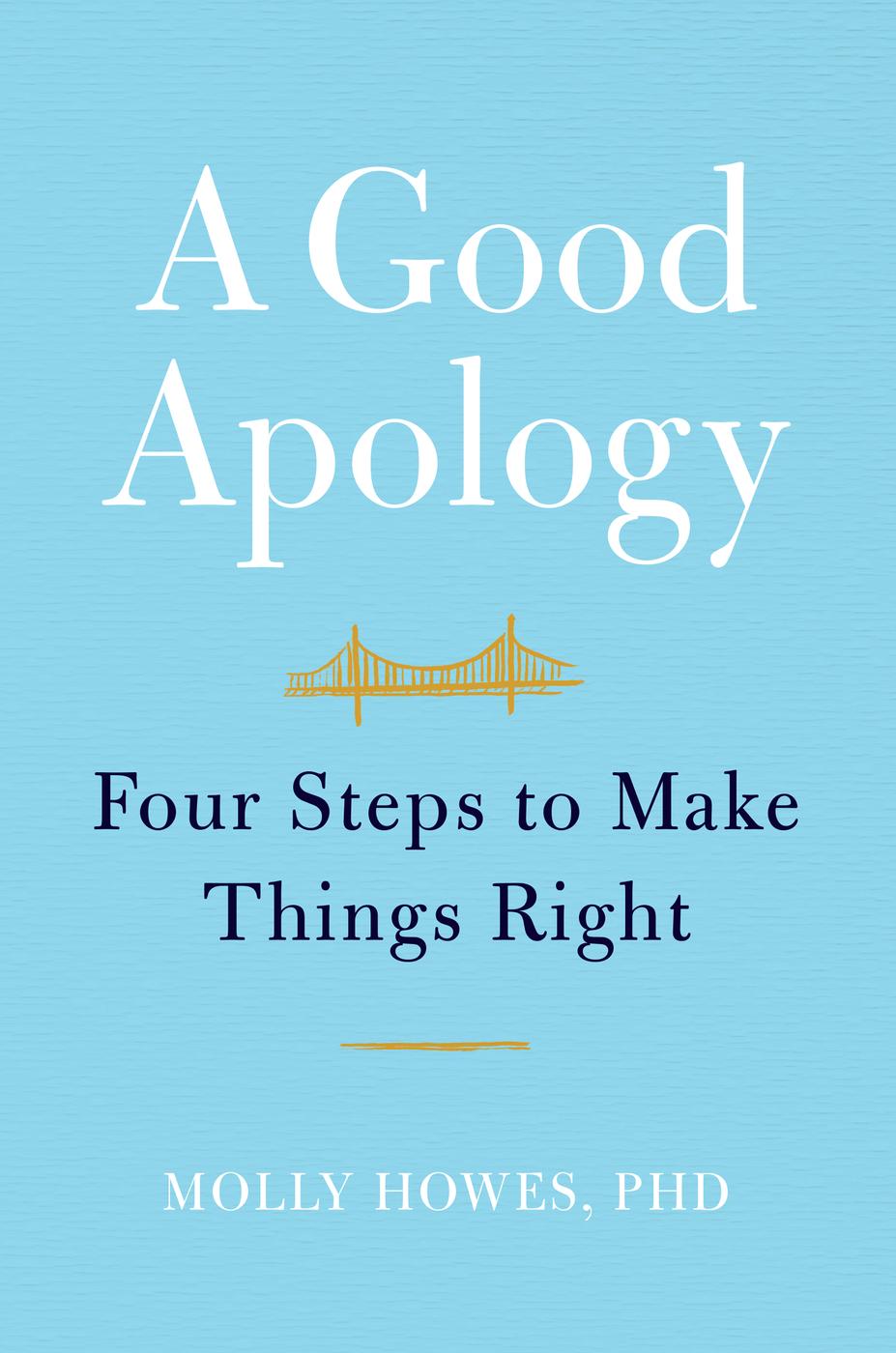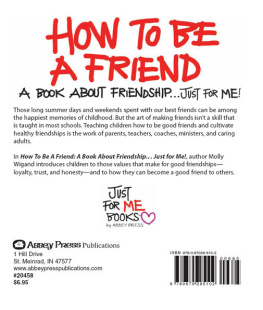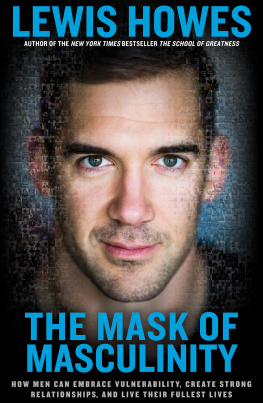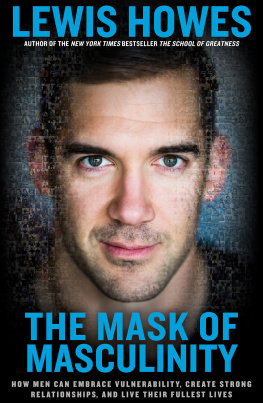Molly Howes - A Good Apology: Four Steps to Make Things Right
Here you can read online Molly Howes - A Good Apology: Four Steps to Make Things Right full text of the book (entire story) in english for free. Download pdf and epub, get meaning, cover and reviews about this ebook. year: 2020, publisher: Grand Central Publishing, genre: Home and family. Description of the work, (preface) as well as reviews are available. Best literature library LitArk.com created for fans of good reading and offers a wide selection of genres:
Romance novel
Science fiction
Adventure
Detective
Science
History
Home and family
Prose
Art
Politics
Computer
Non-fiction
Religion
Business
Children
Humor
Choose a favorite category and find really read worthwhile books. Enjoy immersion in the world of imagination, feel the emotions of the characters or learn something new for yourself, make an fascinating discovery.
- Book:A Good Apology: Four Steps to Make Things Right
- Author:
- Publisher:Grand Central Publishing
- Genre:
- Year:2020
- Rating:5 / 5
- Favourites:Add to favourites
- Your mark:
- 100
- 1
- 2
- 3
- 4
- 5
A Good Apology: Four Steps to Make Things Right: summary, description and annotation
We offer to read an annotation, description, summary or preface (depends on what the author of the book "A Good Apology: Four Steps to Make Things Right" wrote himself). If you haven't found the necessary information about the book — write in the comments, we will try to find it.
A Good Apology: Four Steps to Make Things Right — read online for free the complete book (whole text) full work
Below is the text of the book, divided by pages. System saving the place of the last page read, allows you to conveniently read the book "A Good Apology: Four Steps to Make Things Right" online for free, without having to search again every time where you left off. Put a bookmark, and you can go to the page where you finished reading at any time.
Font size:
Interval:
Bookmark:

All the stories in this book are based on true events, but both the stories and the characters in them have been altered and combined with other stories and people. The characters should not be construed as belonging to any particular racial identity or ethnicity.
Copyright 2020 by Mary J. Howes, PhD
Cover design by Lisa Amoroso. Cover copyright 2020 by Hachette Book Group, Inc.
Hachette Book Group supports the right to free expression and the value of copyright. The purpose of copyright is to encourage writers and artists to produce the creative works that enrich our culture.
The scanning, uploading, and distribution of this book without permission is a theft of the authors intellectual property. If you would like permission to use material from the book (other than for review purposes), please contact permissions@hbgusa.com. Thank you for your support of the authors rights.
Grand Central Publishing
Hachette Book Group
1290 Avenue of the Americas, New York, NY 10104
grandcentralpublishing.com
twitter.com/grandcentralpub
First Edition: June 2020
Grand Central Publishing is a division of Hachette Book Group, Inc. The Grand Central Publishing name and logo is a trademark of Hachette Book Group, Inc.
The publisher is not responsible for websites (or their content) that are not owned by the publisher.
The Hachette Speakers Bureau provides a wide range of authors for speaking events. To find out more, go to www.hachettespeakersbureau.com or call (866) 376-6591.
Library of Congress Cataloging-in-Publication Data
Names: Howes, Molly, author.
Title: A good apology : four steps to make things right / Molly Howes, PhD.
Description: New York : Grand Central Publishing, 2020. | Includes bibliographical references and index. | Summary: "Dr. Molly Howes uses her own experiences with patients at her practice to exemplify the importance of a proper apology, and how we can all hone our technique. Learn how to craft an effective apology with this four-step model: 1. Listen to and empathize with the other person's hurt 2. Make a sincere statement of regret and acknowledge harmful actions 3. Make restitution for the pain caused 4. Prevent repetition of the injury An apology is a small-scale event between people, but it's enormously powerful. Never until now has there been a comprehensive book giving readers the tools to fix their relationships, make amends, and move forward, all through the power of a great apology"-- Provided by publisher.
Identifiers: LCCN 2019050663 | ISBN 9781538701317 (hardcover) | ISBN 9781538701324 (ebook)
ISBNs: 978-1-5387-0131-7 (hardcover), 978-1-5387-0132-4 (ebook)
E3-20200615-DA-NF-ORI
To the courageous people whove sat with me
and shared their stories,
I dedicate this gift of gratitude.
Explore book giveaways, sneak peeks, deals, and more.
Tap here to learn more.


I am perhaps obsessed with apologies. As a psychologist, I find them crucial in my work with people. I pore over books on the subject and study religious texts. For years, Ive collected apology stories. I clip them from newspapers, old-school style, and keep them in a box under my desk.
Recently, the stack has grown fast.
During the #MeToo movement, weve watched the march of shame across our newsfeeds by high-profile men accused of sexual misconduct. The examination of apologies has become a national pastime and given Im sorry the weight of a political act. Whether they are f rom heads of state who relay their official remorse for governmental mistreatment of citizens or from well-known figures in front of microphones who regret their deception, sexual misconduct, and other trust-breaking behaviorwe tweet and post, debate and dissect the sincerity and effectiveness of these public statements. Weve made such a sport of apologies that the New York Times has presented us with a Choose Your Own Public Apology column with fill-in-the-blank options. For all our public dialogue, however, the apologies themselves dont seem to be getting much better.
Right now, we are in an extended moment of public attention focused on saying Im sorry, but the value of apologies is timeless and universal. We need good ones in our personal lives every bit as much as we need them in public discourse. Each time we face another persons injury with courage and humility, we heal individual hurt. When we apologize, we restore damaged connections. We reduce our isolation and shame, and we make our relationships stronger. We build a kinder and more civil society.
So, if apologies are so useful and important, why are we so bad at them?
Of the hundreds of patients Ive worked with, many struggle with how to apologize wellas do many of the people I know outside my practice. I, too, have missed opportunities and made my share of poor attempts to repair mistakes. For a myriad of cultural and psychological reasons, apologizing well is really hard to do. Human perceptual and cognitive biases make seeing our own mistakes and their effects on other people challenging. Most of us labor under misconceptions and myths about apologies, including the idea that our intentions determine our effects on other people. That is, if I didnt mean to hurt you, you cant be hurt. Or we subscribe to the now-historic Hollywood notion that love means never having to say youre sorry. Further, we rarely see public figures modeling good apologies.
Many of us make no attempt to apologize when we should, and when we do, its often in ways that inflame the situation or, at best, only partially heal the damage. But the good news is that each of us has the capacity to make an effective apology. One of the biggest, most universal roadblocks is a simple lack of technique. Thats why I wrote this book.
My journey toward developing an apology technique began in childhood. In the face of chaos and neglect, including three years I spent in an orphanage, I did what children often do: I tried to control what I could control. When I couldnt fix the unpredictable world around me, I learned to mend physical things. I replaced errant buttons and glued shattered dishes back together. Even as a child, I had trouble tolerating waste. I held on to broken things long before I learned that relationships, too, can be salvaged rather than discarded.
Although I was unaware of it at the time, that early effort was good preparation for becoming a psychologist. My faith that hurt can be repaired undergirds my approach to psychotherapy as well as my personal philosophy. I serve as a hope merchant. I can see possible favorable outcomes, and I can help people journey through thorny terrain to reach them.
Earlier in my career, though, I was at a loss when grappling with the unresolved cracks between people. Just out of college, I worked with a woman who lived in extreme isolation because she couldnt face the family shed let down way too many times. I was puzzled and frustrated that she didnt respond to her familys attempts to connect with her, but I didnt know how to help her move through her shame. Months later, she killed herself. Ill never forget the stunning sense of wastefulness I felt. Her life was lost because she couldnt face and mend what shed damaged.
Soon after, in graduate school, I worked with a couple whod spent almost three decades unhappily stewing about the husbands flirtation with another woman during their first pregnancy. I could teach them to communicate better, but I didnt know yet how to help them face their stubborn resistance and resentment so that they could heal this foundational wound.
Font size:
Interval:
Bookmark:
Similar books «A Good Apology: Four Steps to Make Things Right»
Look at similar books to A Good Apology: Four Steps to Make Things Right. We have selected literature similar in name and meaning in the hope of providing readers with more options to find new, interesting, not yet read works.
Discussion, reviews of the book A Good Apology: Four Steps to Make Things Right and just readers' own opinions. Leave your comments, write what you think about the work, its meaning or the main characters. Specify what exactly you liked and what you didn't like, and why you think so.











